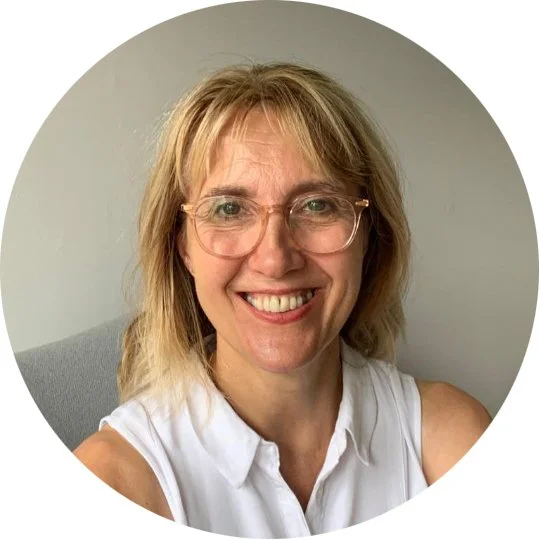Specialist therapists, such as occupational therapists or physiotherapists, are clinicians who work from our practice and are members of the Shelly Beach team. Their specialist expertise can be very beneficial as part of a client’s personalised treatment plan. They use the Shelly Beach Practice approved models and way of working. They are not psychologists or dietitians but are very experienced in working with eating disorders and have an excellent understanding of evidence-based practice. They may work on their own with a client or alongside one of our dietitians and/or psychologists.
.
Yolande Johnson
Physiotherapist and BodySense Practitioner
NZRP, PNZ
PGCert Health Sciences (MindBody Healthcare)
Dip BodySense Therapy (Sweden)
I am a physiotherapist and BodySense practitioner with over 30 years’ experience working with clients of all ages.
I’ve worked in a number of specialist healthcare settings which have involved treating those with eating, breathing and pain disorders, with workplace injuries, disabilities, and with a variety of other complex and chronic conditions.
I have my own private practice and also work in close association with other specialist providers such as Shelly Beach Practice and Mint Nutrition.
I have post graduate qualifications in MindBody healthcare, have lectured at the Auckland University of Technology, am a qualified yoga and Pilates instructor and have specialist training in working with eating disorders.
Eating disorders have long been a special area of interest. After 9 years as a member of the multi-disciplinary team at the Regional Eating Disorders Service where I supported clients in all stages of recovery, I began working alongside the psychologists and dietitians at Shelly Beach Practice. As a physiotherapist, I complement the work of my colleagues by offering their clients body-oriented therapies to manage anxiety, exercise and body image concerns.
Physical therapy can play an important part in a client’s recovery. So often with eating disorders, a person’s perception of their physical self can become distorted which can lead to behaviours that can harm the body. My main aim is to help a client accept and respect their body and gain insight into how to better look after it. One of the keys to
recovery is helping them identify what hinders and also what helps them engage in healthy levels of physical activity and exercise.
I work in an holistic way, using a combination of therapeutic touch techniques for breathing and movement alongside sensory mindfulness and relaxation strategies. Treatment programmes are personalised and provide a balanced, holistic and practical approach to restoring health, wellbeing and function.
For more information, visit www.bodysense.co.nz
Clinic days are Fridays
Catherine Verhaaren
Specialist Occupational Therapist
Dip OT UK/NZROT
Dip Counselling UK
I have been privileged to meet many courageous people in my practice, working alongside them and their families where appropriate to find a path through their eating disorder. It inspires my practice to see the people I work with regain their health and confidence, and together we celebrate each step on their journey to recovery.
My 30 years of experience within mental health settings, with 12 of those years spent specialising in eating disorders, has given me a deep understanding of the difficulties faced by those dealing with anorexia nervosa.
My background as an Occupational Therapist has helped me develop a greater understanding of the impact of life experiences and has equipped me with a blend of practical and psychological skills. It was during my training in the UK that I discovered my passion for working with people affected by mental health issues. After moving to Auckland, I took up the opportunity to specialise in the treatment of people with eating disorders, joining the Tupu Ora, Eating Disorders Service within the Auckland Health Board.
Coming from a place of empathy, my approach is to build effective therapeutic relationships with each individual, understanding their interests, relationships and goals for work or study. I’ve adopted the philosophy of ‘what matters to you’, rather than ‘what’s the matter with you’, exploring each person’s strengths and finding coping strategies that help them overcome daily challenges.
Evidence-based eating disorder therapies are the cornerstone of my practice and ongoing training and experience enable me to offer a range of therapies and tools. Strategies and skills from dialectical behaviour therapy (DBT) enable people to understand and manage emotional distress and their interactions with others, while sensory modulation assists people to find unique ways of managing anxiety and bring harmony to their lives. Eye movement desensitisation reprocessing therapy (EMDR) is another approach that can be effective.
As part of the specialist eating disorders team at Shelly Beach Practice, I work alongside my colleagues to deliver a holistic and collaborative approach that allows people to move on from their eating disorder and reconnect with their lives.
Clinic days are Wednesday and Fridays
Alix Bradley
Registered Social Worker
MSWP (1st Class Hons), BA/BSc (Psych & Anthropology)
Registered Social Worker (SWRB)
I am a Clinical Social Worker who is specialised in child and adolescent mental health. I am passionate about this age group and have a specific interest in eating concerns and disordered eating.
I have worked in Child and Adolescent Mental Health Services across Auckland and Taupo and am experienced in utilising a range of therapeutic modalities. In addition to eating disorders, I work with young people experiencing emotional difficulties including anxiety, depression, emotional dysregulation, as well as family relationship difficulties. In this work I predominately use Acceptance and Commitment Therapy (ACT) and draw on Cognitive Behaviour Therapy (CBT), including CBT-T and CBT-E for eating disorders; Dialectical Behaviour Therapy (DBT); and relational models, as appropriate.
While many therapies involve individual work, I also recognise the unique and valuable role families have for young people struggling with disordered eating, and believe they are a crucial part of recovery. For this reason, I have been undertaking family-based treatment for a number of years alongside individual therapy.
My focus is on helping young people, and their families, recognise eating struggles and supporting them to find solutions to these difficulties, enabling them to reengage in normal adolescent development and build age-appropriate family relationship.
Clinic days are Tuesdays



